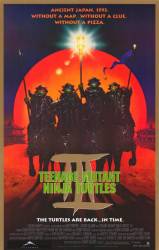Factual error: Raphael tells Yoshi that being a kid, he shouldn't think about war but rather fly "one of those things." He is pointing at kites who have artwork (kabuki-ish makeup with the modern japanese flag) that looks out of place for 1603. (00:56:40)
Factual error: During the movie, characters may use lingo that would not be understood easily in the time period of their counterparts. April for instance uses the word "cool" in the modern sense, and nobody questions that, but you could assume that they don't understand every word and infer nonetheless the meaning from the context. Walker however when he's about to fire his cannon uses an idiom "Try this on for size" that was coined in early XX century. (01:19:40)
Factual error: The movie feels the need to justify the fact that everyone in 1603 Japan happens to speak English (something most kid movies just gloss over) by explaining that they are trading with Great Britain, and therefore the locals picked up the language. That's real cute, but also blatantly false. Trade with the British empire was rather sparse, mostly with Dutch mediation, and knowledge of the English language was practically nonexistent - here, any peasant and even kids are practically bilingual.






Answer: Michelangelo wants to stay behind for the same reasons as Raphael: because in that time and place, they are well respected, even revered as heroes. They can live openly and not be banished to sewers or subway stations.
LorgSkyegon
Mikey didn't want to stay behind because of Yoshi but because of Mitsu. Raphael even points out that she's the reason he doesn't want to return. When Mikey says they should stay, Raph responds, "Now, forget about Mitsu and give me the scepter."